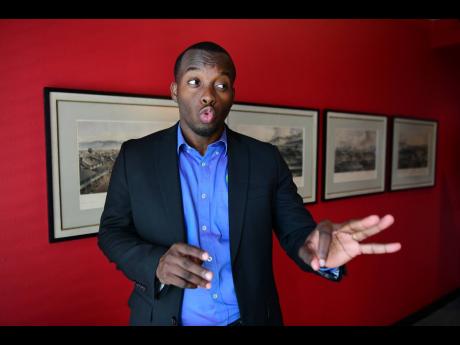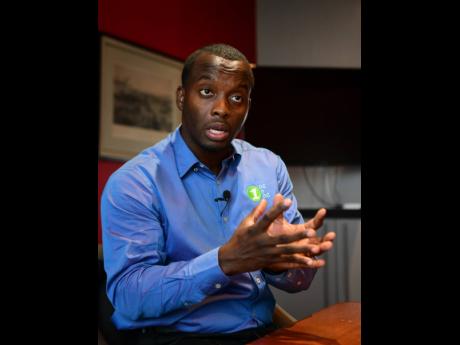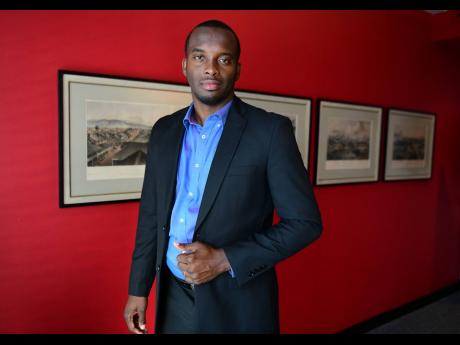Revolutionising education
Ricardo Allen changing lives through One-on-One learning
Today, his remains could have been nearly 20 years old, but instead, his life was saved by a certificate of excellence in instructional technology mounted on the wall of the August Town home he shared with family members.
Ricardo Allen vividly recalls how, with an assault rifle trained on his face, Jamaica Defence Force soldiers barged into their St Andrew home early one morning looking for guns and gunmen and without a warrant.
As fate would have it, a soldier’s flashlight illuminated the certificate and Allen is convinced that is what saved his life.
His mannerly response to them, in English, was also a plus, as well as being a Jamaica College (JC) student.
That fateful morning was a rude awakening to life in Kingston, after moving from rural Trelawny to live with an aunt. The journey from the country was also a move from educational deficiencies and social poverty, but also a sweet naivety so common in rural Jamaica – a blessing and a curse in one.
Described as a smart boy, Allen quickly learnt how to deal with the security forces, observing who their targets were. Screw-faced, tattooed, poorly dressed, chatty mouth push-backs were negative magnets. Allen was none of those and had every intention to keep it that way. Always properly attired, he was more in love with mathematics than concerned with individuals who were ready-made targets for law enforcement.
Now his love for mathematics has grown exponentially and his horizon global. Still, his heart is locally focused.
The man who turned down a prestigious Fulbright Scholarship to remain in Jamaica wants to see an evolution in Jamaica’s education system – which is seen as an apartheid state – that will cause a revolution to give everyone equal opportunity wherever they attend school.
It’s a dream the educator, academic and businessman knows will and must happen. Neither shy nor diplomatic with his views, Allen is bold and uninhibitedly assertive in saying what he means. One thing he does not believe is that legislators who are three-score years and 10 or older should be creating policies to impact two generations younger and who will live half a century longer.
“My idea of how our education should be structured is a skills-based approach, not focusing so much on passing or failing exams, but on the acquisition of skills. I think we should get rid of the entrance examination to high schools. There should not be a test that determines which high school you attend,” Allen told The Sunday Gleaner.
He accepts, and suggests, that the strong footprint of many schools’ alumni, which seek to maintain the status quo of who attend their school, keeps the current unequal situation entrenched.
HOW JC INFLUENCED CAREER PATH
The JC old boy grew up in Rio Bueno in Trelawny. He had dreams of attending Munro College in St Elizabeth, but was faced with costs his mother could not afford. Cornwall College in St James posed similar issues.
“Me as a boy growing up the country, I was smart. But I would not have had the opportunities I now have if I did not move to Kingston and went to Jamaica College. It is there that I met all my mentors, got the knowledge and started my business. I was motivated to pursue what I pursued. And so, even though I have reached a point in my life where I consider myself successful up to this point, successful at the big plan, I have to look back and wonder, ‘What happens to those boys who live in Rio Bueno, Duncans and Jackson Town in Trelawny?’” Allen said.
“I think that by causing persons to go to these name-brand schools – and I am not saying that we shouldn’t have schools that focus on certain things – but what it does is have an unintended consequence of a failure to improve those schools in around those communities. What I am saying is that irrespective of where I live, I should have equal opportunity to get a very good education. And there is a way to do that,” he insisted.
“I started the One-on-One initiative because – oh, and I love maths by the way, it’s my calling – I wanted and I felt like the best way to deliver learning was through personalisation. This is the model I fell in love with. My thought was to create an education system through which, from day one throughout the education system, we know and understand your skills, and the skills that you are lacking, and throughout time, we build on those skills that you lack, and the ones that you have, we allow you to do advanced stuff,” Allen told The Sunday Gleaner.
ONE-ON-ONE
Allen’s One-on-One Educational Services Ltd offers extra classes, personal tutoring services and e-learning solutions through mentorship and personalised attention.
The digital platform is being used in The Bahamas to keep more than 50,000 students in school. According to him, with some 700 islands making up The Bahamas, it’s almost impossible for some islands to have a school and even more uneconomical for a teacher to be sent there to teach a single subject. With more parents opting to homeschool their children, parents and students are signing into One-on-One and accessing selected subjects.
“Some schools can only offer the basis subjects like maths, science or a writing subject such as French. Those students who want to do other subjects, they can connect into the schools that offer that subject. For the Campions and Jamaica Colleges of the world with the capabilities, which the old boys pay for, there is no problem. But I want there to be a model where those teachings can benefit other teachers, schools and students in other schools,” said Allen.
With a camera in the “lesser” schools, the digital platform connects into the main school to access the lessons.
For him, every school in Jamaica should be able to connect into other schools where a subject is being taught that children want to do but is not being offered at their school. The JC student, for example, who wants to do woodwork, should be able to access it from the best teacher wherever it is being taught.
Recalling his barefoot days in Rio Bueno, Allen received three scholarships to attend The University of the West Indies (UWI) after completing JC. Cognisant of the teaching and learning deficiencies between JC and in Trelawny, he asked one of his scholarship donors if he could split the scholarship with a younger sibling. Given the green light, he moved two younger siblings to Kingston, one of whom was not attending school and whom he feared that, without intervention, his August Town experience could become a fatal reality for him.
Allen believes students could become victims of crime, which was moving across the country like wildfire, and the COVID-19 fallout will soon ignite it further, if not arrested. It will take massive investment for the fix.
THE FUTURE OF EDUCATION
“I think it’s gonna be pretty bad if we don’t do something urgently to head off the crisis, but I don’t believe we will get there. We are looking at an existential crisis now – the Ministry of Education reports that more than 100,000 students are disengaged from the educational system – so I cannot begin to address the future of Jamaica if this thing is not addressed,” he stated.
The COVID impact must be addressed separately, Allen believes, and One-on-One is playing a part in that regard. Not a believer in students repeating grades, he said specific programmes should be designed to strengthen their weaknesses, pointing out that high school uniformity is unhelpful to those with learning gaps.
“If we look at education as infrastructure – internet, computers and resources for teachers, better-paid teachers; think of it as all those things, and let’s say we can invest in this like the toll road, where every time you use it you pay, it can pay for education over an extended period of time. Understanding that we will have a better or a more literate society that can produce more, increasing the GDP, that government can get more revenues because more economic activities are taking place, then we will be in a better place. Over the long run, we will improve our outcome,” he noted.
Admitting that a multiplicity of reasons has impacted the system, crime, he said, impacts education the same way lack of education impacts crime.
OF LOTTERY SCAMMERS AND WINDSCREEN WIPERS
Describing lottery scammers as super-talented cons with great convincing skills, Allen believes the ugly scourge can be repurposed into something beautiful.
“These lottery scammers have digital skills. I employ a lot of my developers, programmers and digital artists from the Middle East. Reason, there is not a pool of them here that I feel I can use. What if Jamaica can become a digital hub of this hemisphere, where we have cheaper labour? We can export our services. We can call it knowledge process outsourcing,” he reasoned.
“All of those youth in scamming and all of those things, I want to harness their talent. I want to teach them digital skills that they can use to earn money legitimately, much more than they are doing. I have developers earning US$40 per hour just by using their skills. There are people earning US$100 per hour,” he said.
Allen zoned in on detached and unattached youths with digital skills, before dropping this bombshell offer.
“I want the boys who are at the Devon House stoplight. I want to get them into a room. I want them for four weeks. Two hours each week for four weeks. I will give my time free. I want to give them a computer, internet for the month. And I am going to teach them some digital skills, which they can use to generate legitimate income,” he announced.
Coupled with numerous activities, he promised to show them how they could not only earn exponentially more financially, but also self-respect and respect, by providing them with the opportunity.
With COVID changing the world forever, Allen operates primarily in the digital space.
The world has gone almost completely virtual, and for him that’s not a bad thing.
According to Allen, 1.3 million of the 1.5 million local workforce is untrained beyond the secondary school level in private and public sector combined. Jamaica, therefore, has an untrained, undertrained and underpaid workforce, which is ill-equipped to benefit from the digital revolution.
He not only wants to help them, but is guaranteeing success which will provide the footprint for replication.
“I am not putting those Devon House boys through any university. I will just be teaching them a skill, allowing them to earn. All the people in lottery scamming, I want to get all of them, and teach them. We are not just talking, we are doing,” he stated.
His company has inked a multimillion-deal with FLOW Foundation to train more than 4,000 young professionals islandwide digital skills such as coding, project management, and digital and social media marketing. Information on the initiative is available on FLOW Foundation’s website.
Ricardo Allen – founder and chief executive of One-on-One Educational Services Ltd, motivational speaker, husband, doting father to Emma and Kari, brilliant, bold – is celebrated in Black History Month.



